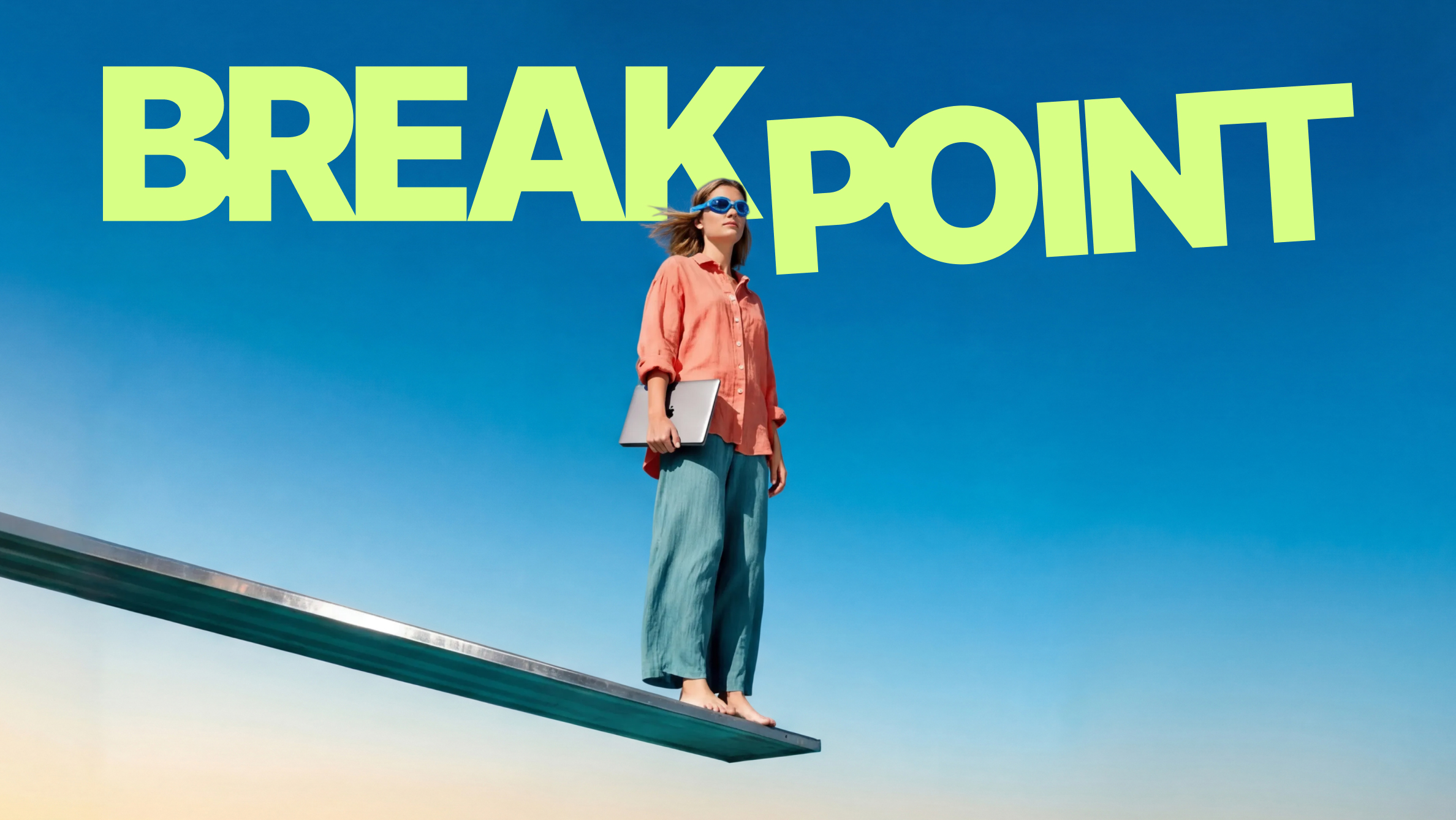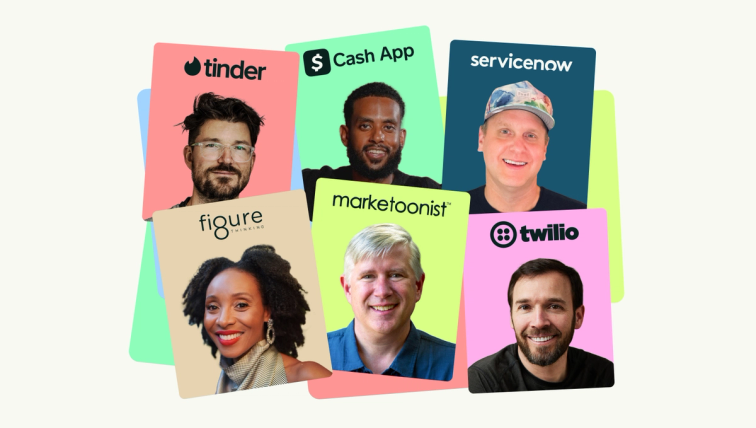
It was a dark day in December.
A young Adam Morgan, now Senior Director of Brand and Creative at Splunk, then a top-tier creative at a world-class agency, didn’t get the promotion. While three of his peers moved up to Creative Director, Morgan wasn’t ready—a fact he humbly recognizes looking back today.
After 20+ years in creative leadership, Morgan can say with authority, “There’s a huge chasm between being a great creative and being a creative leader.”
The problem is, that chasm is wreathed in mystery.
All too often, creative leaders feel stuck because they don’t know the answer to the million-dollar question, “What’s my next step?” Or, continuing with our metaphor, “How do I cross the chasm?”
The truth is, there’s no official manual on how to become a great creative leader. No clear career path carved in stone. But if there was a manual, Morgan could author it.
In fact, he’s made a strong start with his Creative Leadership Maturity Model. Based on insights from his own lived experience and his podcast, Real Creative Leadership, he describes this model as, “a tool to help you know where you can grow as a creative leader.”
So, if you’re a creative leader feeling a little stuck, read on for a dose of Goo Gone…
What’s on the docket:
- What is the Creative Leadership Maturity Model?
- Creative Leadership Stage 1: Creative Work
- Creative Leadership Stage 2: Creative Team
- Creative Leadership Stage 3: Creative Vision
- Creative Leadership Stage 4: Creative Company
- Creative Leadership Stage 5: Creative Industry
- Real Creative Leadership is About so Much More Than the Craft
What is the Creative Leadership Maturity Model?
The Creative Leadership Maturity Model divides growth into five stages. As creatives ascend through each stage, their influence expands from a personal and a team level, to a company and an industry level.
Notice how early stages focus on hard skills, like honing the craft, mastering tools and executing seamlessly, while later stages encompass soft skills, like understanding relationships, building a safe environment and developing a vision.
Back to Morgan’s dark day in December for a moment…
He was crushed. He’d spent a decade focusing on the craft. He was one of the best at an agency of 100s—competing on the biggest campaigns, coming up with the brightest concepts. Yet he didn’t get the promotion.
Why? After having conversations with leadership, he realized it wasn’t enough to be the best at the creative. He needed to focus on soft skills he hadn’t prioritized in the past: Speaking the language of clients, fostering relationships, understanding vision, the list goes on.
“Being good at the work is number 10 on the list of one through 10 items you need to be a great creative leader.” — Adam Morgan, Senior Director of Brand and Creative at Splunk, former Executive Creative Director at Adobe
You may see the parallels with Morgan’s leadership model. Yes, you need to hone your craft first. That’s ground zero. But to get off the ground, you’ll need to focus on more nuanced leadership skills.
Coming full circle, this is where the Creative Leadership Maturity Model can help. By assessing your skills against each stage, you can figure out where you fall on the creative leadership scale and the competencies you’ll need to keep rising.
Naturally, we thought we'd inject a little extra creativity into assessing your level. Based on this model, we put together a quick, three-minute quiz that will assign you a creative character according to your leadership stage.
Take the quiz now and come back for advice tailored to your stage. Or, if you’re the kind of person who likes to spoil the last page in a book, carry on for a breakdown of each stage and an introduction to our (inter)stellar quiz characters.
Creative Leadership Stage 1: Creative Work
Archetype: Astronaut
A doer dedicated to making creative ideas come to life.
The first stage of the Creative Leadership Maturity Model is all about the work. It’s about honing your craft and making great creative ideas come to life. You’re focused on managing yourself, rather than a team.
During his first decade working as a hands-on creative at agencies, Morgan was at this stage. He had a clear vision for his own work and guided the execution of creative ideas, from concepting all the way to storytelling and art directing.
On the creative leadership career path, this is an essential stage. It’s when you learn how to create emotional, connected experiences—when you train yourself to step into your target audience’s shoes, feel their sore feet and massage away the pain with your product.
Once your portfolio is full of five-star foot rubs, you’ll be ready to look beyond the work to the team. That means beginning to develop more soft skills, like building relationships, inspiring team members and understanding brand strategy.
Creative leadership skills to hone at this stage:
- Guide and inspire work in story, art and video
- Focus on creative craft and execution
- Vision for better work
- Focus on managing self
Insights and book recommendations to help you get to the next stage:
- For a quick read: Finding Growth in Your Creative Career: A Modern Approach to Creative Department Career Paths by Adam Morgan
- For a 30-minute video break: What Creatives Need to Do Their Best Work with Luke Sullivan and Adam Morgan
- For your bookshelf: Creative Directions: Mastering the Transition From Talent to Leader by Jason Sperling
Creative Leadership Stage 2: Creative Team
Archetype: Skymapper
A team player fluent in creative expression and execution.
The next stage of creative leadership is all about the team. Once you’ve honed your personal processes, you’re ready to look outward and take on team leadership. As a newly minted leader, you’re focused on streamlining systems and sparking inspiration on a team level.
Back in the day, Morgan recalls figuring out how to make sure everyone on his team was using the same fonts. Nowadays, Digital Asset Management (DAM) systems eliminate many of these headaches. (Hint: If you don’t have a DAM, this stage is a great time to implement one.)
Nitty-gritty details aside, the heart of this level is learning how to support and manage a team. How to get and give feedback. How to guide, not govern. How to recognize the signs of burnout and take steps to prevent it.
Ultimately, a good leader knows their team needs breathing room to think, stew and do true creative work. Create that room for them—employ strategies like outsourcing and DAMs—and you’ll be well on your way to the next stage of leadership (and well-liked to boot!).
Creative leadership skills to hone at this stage:
- Guide and inspire team
- Focus on systems, tools and processes
- Fluent in creative execution
- Vision for creative department
- Focus on managing down
Insights and book recommendations to help you get to the next stage:
- For a quick read: How to Be Perfectly Whelmed: Balancing Your Creative Team’s Workload by Adam Morgan
- For a 30-minute video break: How to Organize and Lead a Creative Team with Kevin Frank and Adam Morgan
- For your bookshelf: Herding Tigers: Be the Leader That Creative People Need by Todd Henry
Creative Leadership Stage 3: Creative Vision
Archetype: Star captain
A leader skilled at crafting and selling a creative vision.
The third stage of creative leadership raises the stakes: Now, you’re focused on crafting and selling a creative vision. Moving beyond your team, you’re charged with inspiring company leadership, especially the marketing and sales executives.
As Morgan puts it, “There are a lot of skills you need to be a creative leader…relationship building, selling and pitching, creating good work…but the one that distinguishes a creative leader from just a leader is the ability to see creative potential. The ability to be a visionary.”
In other words, this stage is pivotal. You’re taking a big leap from focusing on yourself and your team to pitching to the CEO or CMO—pushing a strategic creative vision and communicating the value of creativity itself.
If you succeed in conveying that value, you’ll have built a safe environment for your creative team and a trampoline for your own growth. Because when leadership understands how design connects to dollars, they’ll understand your value and your team’s value, too.
Creative leadership skills to hone at this stage:
- Inspires company leadership, especially marketing and sales
- Skilled at selling work to clients or leadership
- Focus on streamlined approvals and team visibility
- Builds a safe environment for creative team
- Vision for creative strategy
- Focus on managing up
Insights and book recommendations to help you get to the next stage:
- For a quick read: How Successful People Give Creative Feedback: The Two Essential Ingredients to Become a Champion of Creativity by Adam Morgan
- For a 30-minute video break: How to Measure Creative Ideas with Adam Morgan
- For your bookshelf: Radical Candor: Be a Kick-Ass Boss Without Losing Your Humanity by Kim Scott
Creative Leadership Stage 4: Creative Company
Archetype: Astral director
A trendsetter inspiring a whole company’s creative culture.
The fourth stage of creative leadership builds on your visionary abilities. But now, you’re sharing your vision company-wide and cultivating an environment where creativity can thrive in every nook and cranny—from customer success and operations, to finance and human resources.
Morgan explains this stage is about making creativity a differentiator for your product and services. To accomplish this, you’re going beyond having a vision for creative strategy. Now, your vision extends to your company’s marketing strategy.
This involves managing sideways (that is, fostering strong connections with your peers) and working on a storytelling level. Alongside marketing leaders, you’re strategizing brand positioning and saying, “Here’s the big story we’re trying to tell the world.”
When people believe in creativity across your entire organization—not just in leadership or your own team, but on every level—you’ll be ready to transcend this stage. You’ve built a rocketship: A company with a trusted creative culture. Next stop, the universe.
Creative leadership skills to hone at this stage:
- Inspires whole company with creative culture
- Builds a safe environment for creativity company-wide
- Creates a culture of risk-taking, where everyone can speak up
- Focus on building trust and selling to peers across org
- Makes creativity a differentiator for products, services and brand
- Vision for marketing strategy
- Focus on managing sideways
Insights and book recommendations to help you get to the next stage:
- For a quick read: Making Better Marketing Decisions: Why Leaders Should Try Intuitive Thinking By Adam Morgan
- For a 30-minute video break: Creating a Culture Where Ideas Thrive with John Coyne and Adam Morgan
- For your bookshelf: Positioning: The Battle for Your Mind by Al Ries and Jack Trout
Creative Leadership Stage 5: Creative Industry
Archetype: Cosmic creative
A taste-maker influencing the creative industry at large.
The final stage of creative leadership takes you beyond your business and into the outer reaches of the industry. In the universe of creativity, you’re guiding and inspiring other industry leaders and businesses as a whole.
Morgan shares the example of speaking at global events, like Adobe Max, an annual conference on all things creativity. Your goal at this stage is to become a trusted voice in the industry. A visionary making the creative universe a better place.
Sounds a bit lofty? Absolutely, it is. You have to go big—launch moonshots, share cosmic thoughts—to inspire on this level. As Morgan puts it, “It’s really that 10x thinking of how we can help creativity make a bigger impact on business.”
The key concept to pick up on here: Business impact. You speak fluent creative. Now’s the time to learn how to speak fluent business strategy. Connect the dots between creative and business value, and your vision will resonate on an intergalactic stage.
Creative leadership skills to hone at this stage:
- Guide and inspire industry and business leaders
- Builds creative vision into other departments of the company
- Trusted voice on creativity in business
- Focus on building creative skills in everyone
- Makes positive impact for creativity in the industry
- Vision for business strategy
- Focus on managing out, as well as up, down and across
Insights and book recommendations to help you at this stage:
- For a quick read: The Three Types of Strategists. And One That Isn’t. What Type of Strategist Are You? By Adam Morgan
- For a 30-minute video break: Finding Your Voice as a Creative Leader with Liz Oh and Adam Morgan
- For your bookshelf: Sorry Spock, Emotions Drive Business: Proving the Value of Creative Ideas With Science by Adam Morgan
Real Creative Leadership is About so Much More Than the Craft
Morgan did end up getting that promotion. And many more after that.
The unlock: Realizing creative leadership is about so much more than the craft…
And reading a lot of books. No, really, when asked what his number one piece of advice to other creative leaders would be, Morgan said, “You have to read to lead.” Read books on leadership. Book on managing. Books on marketing strategy.
He prefaced this advice by noting everyone is at a different step in their creative careers, so it’s hard to know what’s best for any one person. But if you read widely, you’ll find nuggets of wisdom that apply to your path.
The same logic applies to the Creative Leadership Maturity Model. We’re all at different stages in our journeys—you may not fit perfectly into one level or another. But if you use this model as a guide, you can find new areas to grow in your creative career.














